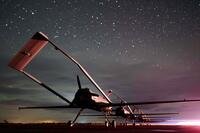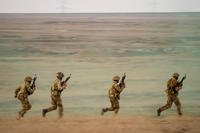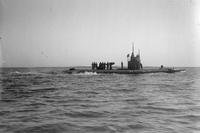Joseph V. Micallef is a best-selling military history and world affairs author, and keynote speaker. Follow him on Twitter @JosephVMicallef.
The Night Wolves, Nochnye Volki in Russian, are a Russian motorcycle club that over the last two decades has morphed into a pan-European corporation and a mini-conglomerate of about 60 different businesses. Their activities include consumer organizations, entertainment, security services and a variety of manufacturing businesses ranging from motorcycle accessories to clothing.
They have also been implicated in several Kremlin-sponsored covert operations in eastern Ukraine and in the Russian takeover of Crimea. And they were suspected of being involved in the assassination of Milo Djukanovic, the president of Montenegro. The assassination is now seen as an attempt to derail the country's entry into NATO.
Nicknamed Putin's Angels, they are widely seen as a sort of militia that operates in a variety of roles at the Kremlin's behest while, at the same time, affording the Russian government the luxury of denying any responsibility for their actions.
The group, many of its leaders and several of its affiliated companies, has been placed on sanctions lists by the U.S., Canada and several European countries.
The Night Wolves have openly boasted about their close ties to Vladimir Putin. He is an honorary member and has often gone on motorcycle rides with the group, although he rides a specially modified three-wheel Harley Davidson motorcycle, rather than the regular Harleys that the group favors.
They have received substantial funding from the Kremlin; with estimates ranging from tens of millions of rubles to several hundred million rubles. The group prides itself on its strident Russian nationalism, a curious mixture of Soviet and traditional Russian iconography.
They proudly declare themselves to be anti-feminist and anti-gay, reject what they see as the debilitating corruption of Western society, and emphasize their devotion to the Russian Orthodox Church.
They acknowledge Vladimir Putin as their hero, openly declaring that they are willing to die for him. They decorate their clubhouses, emblems and clothing with pictures of Joseph Stalin, depicting him as a Russian hero and role model for Russian youth.
in August 2018, the group opened a motorcycle clubhouse in Slovakia, prompting warnings from Andrej Kiska, the president of Slovakia, and from Slovakian intelligence agencies, especially after Radio Free Europe released drone footage showing that the clubhouse concealed a tank and an armored personnel carrier.
Who exactly are the Night Wolves? Where did they come from? Is this just a strident, nationalistic, Russian motorcycle club or a de facto Kremlin militia; another spear in Russia's arsenal of unconventional, "new generation warfare"? Finally, are they a threat to the political stability of Eastern Europe and the former Soviet Republics, or just another example of the Kremlin's smoke-and-mirrors military capabilities?
The Origins of the Night Wolves
The Night Wolves began as a mix of Western rock music fans -- mostly metal heads -- and motorcycle enthusiasts in the early 1980s Moscow underground scene.
Starting in 1983, they began to organize what were then illegal rock concerts in Moscow. After the onset of Perestroika under Soviet President and General Secretary Mikhail Gorbachev, the group became the USSR's first official motorcycle club in 1989.
The group was organized by Alexander Zaldostanov, a former dental surgeon who goes by the moniker "The Surgeon." Zaldostanov, a Ukrainian by birth, grew up in Sevastopol in Crimea. His mother was a Russian doctor and his father a Georgian.
Originally, the club was patterned after the American motorcycle club Hells Angels. The Night Wolves rode Harley Davidson motorcycles. They adopted the Hells Angels rule book and had it translated into Russian.
In August 1991, the Night Wolves helped man barricades around the Russian parliament when hard-line communists dispatched tanks to try to topple the Gorbachev government. Zaldostanov was later awarded a medal by Russian President Boris Yeltsin for his role in helping to thwart the August coup attempt.
Over the 1990s, the club expanded into a variety of related businesses, opening a rock club called The Sexton, modeled after a club with the same name in West Berlin where Zaldostanov had worked as a bouncer before the fall of the Berlin Wall.
The group launched a "Wolf Wear" clothing line, as well as a tattoo parlor and bike shop. The Night Wolves also began to offer security for local Russian rock bands. Their activities quickly evolved into security services and protection for businesses trying to avoid shakedowns from local police and gangsters. Some have claimed the group became its own protection racket.
Starting in the early 2000s, however, Zaldostanov began to transform the group into a staunchly Russian nationalistic organization. In the process, the organization became increasingly anti-Western.
It also forged strong ties with the Russian Orthodox Church. About this time, the group began sponsoring motorcycle pilgrimages to Orthodox holy sites. They also began using the imagery of a 14th century Orthodox monk named Alexander Peresvet.
His death, in hand-to-hand fighting with the Mongols, was said to have inspired a small Russian force to defeat a much larger Mongol Army in the battle that followed. Peresvet is often described as a quintessential Russian nationalist whose martyrdom inspired Russians to throw off the Mongol yoke.
Often portrayed as a gallant warrior-monk astride a horse, he is revered in the Russian church as a saint. Significantly, the Kremlin chose to name its recently unveiled high-energy anti-missile laser cannon the Peresvet.
The Russian Orthodox Church has historically played a major role in fanning Russian nationalism. The current leader of the Russian Orthodox Church, Patriarch Kirill (Vladimir M. Gundyaev), is a former intelligence officer with the Soviet KGB.
During this period, the motorcycle club also grew close to the Kremlin. In 2008, the group participated in a rally to commemorate the election of Dmitry Medvedev as Russia's president.
The next year, Zaldostanov met with then Russian Prime Minister Vladimir Putin at a motorcycle rally in Sevastopol. Putin rode with the Night Wolves at rallies in Sevastopol in 2010 and Novorossiysk in 2011.
At Novorossiysk, Putin publicly thanked Zaldostanov for his "service to Russia." In 2013, he awarded him the Order of Honor medal for his efforts in "youth patriotic education" and for "honoring the memory of the fallen from the Great Patriotic War."
Zaldostanov's close ties to Putin and to the Kremlin were underscored when he was chosen to be a torch-bearer at the 2014 Sochi Olympics. In an added gesture of official approval, the club's flag, which depicts a snarling, flaming wolf, was carried into space and was displayed in the Russian section of the International Space Station.
Since then, the motorcycle club has grown impressively. It now includes around 7,000 members spread across more than 50 chapters throughout Russia and Eastern Europe. In addition, the group has expanded into a number of additional businesses focusing on security services and paramilitary training. It has also organized patriotic rallies and entertainment, which are broadcast on Russian television.
The Night Wolves as Kremlin Agents
The current Russian doctrine of New Generation Warfare, also sometimes referenced as non-linear warfare, mandates the use of non-governmental organizations in a military or quasi-military support role under conditions that preserve the Kremlin's ability to deny that their actions are officially sanctioned.
The Night Wolves have certainly been used in that kind of capacity by the Russian government.
The group played a highly visible role during the Russian takeover of Crimea. As recently as a week before the arrival of Russian Special Operations Forces on February 27, the group was active in organizing and manning roadblocks and checkpoints, distributing propaganda, collecting intelligence and organizing protests and civilian self-defense units, as well as distributing arms and possibly coordinating these actions with the Russian military.
The group was also used to intimidate local Ukrainian government officials and capture and detain Ukrainian military officers. They also participated in a raid on a Ukrainian naval base in Sevastopol and the takeover of a natural gas distribution facility.
The Night Wolves were one of only two non-governmental organizations that carried automatic weapons and participated in joint operations with Russian Spetsnaz units in Crimea during March of 2014.
After the successful Russian takeover of Crimea, Zaldostanov and at least 10 other members of the Night Wolves were awarded the military campaign medal "For the Return of Crimea."
The group has continued its role in Crimea.
In June 2014, they were awarded a contract by the city of Bakhchysarai to provide "youth patriotic education" and "municipal security services." They are also working with local police in Sevastopol.
The group played a similar role in the pro-Russian enclaves of Luhansk and Kharkiv in eastern Ukraine. Using their local chapters and their social media platforms as a front, they recruited fighters to serve in the pro-Russian militias. Up to 40 members of the Night Wolves have fought with pro-Russian Ukrainian militias, and several members have died in the fighting.
Members of The Night Wolves are now used by the Ministry of Internal affairs of the Luhansk People's Republic to provide police and security services including securing critical infrastructure.
The group has been heavily involved in organizing various patriotic festivals promoting Russian nationalism, especially the role played by the Soviet Union during World War II. Many of these patriotic events are conducted under the guise of "youth patriotic education" and feature blatantly anti-Western themes in which heroic Russian figures are pitted against corrupt, degenerate Western antagonists, typically thinly-veiled American symbols.
In one such youth patriotic education event, a character that looks startlingly like the Statue of Liberty attempts to kidnap the snow princess Snegurochka, a character in Russian children's fairy tales. The effort is thwarted by the Night Wolves. The entire production is set to stirring patriotic music, complete with fireworks, and has been broadcast on several occasions on Russian television.
The spectacle is faintly reminiscent of the Stalinist propaganda practice during World War II of televising films about the Russian hero Alexander Nevsky bravely opposing the incursions of the German Teutonic Knights. Only now, the role of the Teutonic Knights has been replaced by Lady Liberty.
A second entertainment extravaganza, also broadcast on Russian TV, was a spectacle staged in Sevastopol in August 2015. Titled "The Forge of Liberty," and held under the auspices of a motorcycle show, the event included thousands of actors and bikers reenacting the Russian takeover of Crimea and the intervention in eastern Ukraine.
The pro-Russian militias were depicted as freedom fighters, while the Ukrainian government was portrayed as a fascist junta secretly controlled by the U.S. and its European allies. The show's plot corroborated the Kremlin's own official version of the Maidan movement, in which Ukrainian fascists overthrew the legitimately elected government with secret Western backing and installed a dictatorship that planned to persecute ethnic Russians.
Starting in 2015, the Night Wolves began organizing annual "Victory Rides" to Berlin to commemorate the Soviet victory over Nazi Germany. Starting in Moscow, in late April, the ride follows the Soviet advance on Berlin through Poland and Germany.
Often wearing WWII-era Soviet military uniforms and shouting Soviet slogans from the war, such as "For the Motherland" and "For Stalin", the rally finishes at the Soviet War memorial in Berlin on May 9, the day that the city fell to the victorious Red Army. Poland and Ukraine have both banned entry to the Night Wolves.
To add insult to injury, the group held a candlelight ceremony to commemorate the murder of thousands of Polish military officers in the Katyn Forest, despite requests by relatives of those officers not to do so. The murders were ordered by the Soviet leader Joseph Stalin, a man who the group openly venerates. Their new, recently unveiled, prototype motorcycle is called the Stalinets.
In 2015, the Night Wolves also spearheaded the creation of the Russian anti-Maidan movement. The intent of the anti-Maidan movement was to protect the Kremlin from a color revolution, like the ones that swept through Ukraine and other former Soviet Republics.
According to Zaldostanov, the purpose of the anti-Maidan movement is to oppose Maidan-style democratic revolutions and to show resistance "to the global satanism, the growing savagery of Western Europe, the rush to consumerism that denies all spirituality, the destruction of traditional values, all this homosexual talk, this American democracy."
The Night Wolves have been conspicuous in the Balkans, where they are perceived as the front line of Moscow's attempts to increase its influence in the region. In 2018, the Night Wolves held a 9-day tour of the Balkans, billed as a "pilgrimage" and the "Russian Balkan Tour."
The trip was intended to showcase the deep ties between Serbia and Russia, as well as an opportunity to show support for the Serb-dominated Republika Srpska. The would-be country, which covers about half of Bosnia-Herzegovina, wants to secede. The movement is headed by Millard Dodik, a hardcore Serb nationalist, who was recently placed on a U.S. sanctions list.
The U.S. and NATO oppose the secession of Srpska and consider it a threat to the ongoing stability of Bosnia, while Russia and Serbia support the separatists. Banja Luka, the prospective capital of Republika Srpska, has been described as the most pro-Russian city in the Balkans.
The most recent incident with the Night Wolves occurred in July 2018, when the club announced the establishment of a club in Dolna Krupa, just 43 miles from the Slovak capital of Bratislava, and near the junction of the borders of Slovakia, the Czech Republic and Austria.
The president of Slovakia, Andrej Kiska, declared that the motorcycle club "posed a national security risk," as did the spread of other, Russian sponsored, non-governmental organizations. At the same time, a group of more than 200 Slovak intellectuals published an open letter to the government urging it to eject the motorcycle club from the country.
A few weeks later, Radio Free Europe released drone footage showing the presence of a tank and an armored personnel carrier on the club's grounds. For a sample of the drone footage go here.
It later turned out, however, that the military equipment belonged to the Slovak military and had been borrowed, without authorization, from a Slovak military museum. The museum's director was apparently a friend of Josef Hambalek, a Slovak para-military fanatic, who was the official founder of the Night Wolves Slovak chapter.
Despite the controversy precipitated by the Night Wolves latest escapade, a Slovak intelligence officer, in a private conversation with the author, took a more sanguine view.
"At the height of the Cold War, the USSR threatened to overrun Europe with thousands of massed tanks and millions of mechanized infantrymen," the officer, who did not want to be named, said. "The best Moscow can do now is to send a bunch of overweight, middle-aged bikers on Harleys to try to intimidate us.
"Russia still poses a threat to Eastern Europe, but the Night Wolves are poseurs who are playing at being special forces," he said. In a conflict, "NATO would make short work of the Night Wolves ... they are a myth, promoted by Moscow to compensate for the power that it no longer has."
The Night Wolves: An Assessment
Are the Night Wolves the spearpoint of the Kremlin's new arsenal for non-conventional warfare or a motorcycle club with paramilitary delusions?
The answer is, a little bit of both. They certainly play a role in promoting the Kremlin's view of the world and in justifying Moscow's actions. Under the guise of "youth patriotic education," they articulate a narrative that mirrors the Kremlin's view of the West. Such activities would take place, however, regardless of the existence of the Night Wolves.
As would-be paramilitary operatives, they have shown their usefulness in places like Crimea and eastern Ukraine, but there is nothing that the Night Wolves did that couldn't have been accomplished by an additional handful of "little green men."
They are, however, a useful measure of Russia's aims in using non-conventional military assets, even if those assets are still of mixed effectiveness and, in some cases, exist more in theory than in fact.
Where the Night Wolves have been useful to the Kremlin is in allowing it to dial up tension at its whim, simply by sending a bunch of bikers on tour. For the expenditure of a few thousand rubles Moscow can dominate the local news, create uncertainty and fear, and undermine the legitimacy and confidence of national governments.
From the standpoint of creating chaos and uncertainty, the Night Wolves have shown themselves to be an economical weapon in Moscow's arsenal, even if their military value is dubious.
-- The opinions expressed in this op-ed are those of the author and do not necessarily reflect the views of Military.com. If you would like to submit your own commentary, please send your article to opinions@military.com for consideration.















